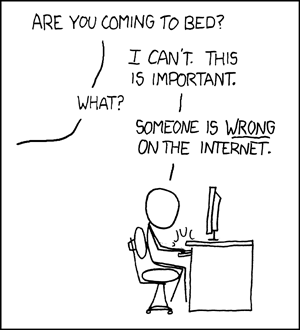Why I care about climate change
Posted on 3 August 2010 by John Cook
There was a recent comment posted on Skeptical Science that questioned my motives, accused me of being politically leftist and wondered where my funding came from. The comment broke several rules in our Comments Policy so was deleted. However, I emailed the commenter, and answered all his questions. Through subsequent discussion, I think we came to understand each other a little better. So while I always try to keep the discussion focussed on science, I'm going to make a brief exception here and share my own personal reasons why I spend so much time reading and writing about climate science. I will note in advance that my motives are personal ones - I'm sure many of you come at this from completely different directions. This is just for the sake of anyone wondering what drives Skeptical Science.
Let me first say what doesn't drive Skeptical Science. For starters, it's not for this reason:

Ironically as I worked on this post approaching 1am, my wife woke up and came into the room, wondering what I was doing still up.
Secondly, it's not about money. There's no organisation or group sending me money. The sum of Skeptical Science's funding is a couple of Paypal donations per week. So I can assure you financial reward or even earning a basic livelihood is not a motivating factor. On the contrary, Skeptical Science comes at a personal financial cost as every hour spent on climate is an hour less to spend on paid work (flexibility of work hours is the blessing and curse of the self-employed). The realities of providing an income to support my family puts some limit on the time I can spend on Skeptical Science, but I always make some time.
It's not about politics. I'm not affiliated with any group or organisation, nor am I a member of a political party. I don't hold any particular political ideology (I'd categorise myself as a swing voter, voting both sides in the last two elections). I've never actually considered myself an environmentalist. I have to confess I don't send sleepless nights fretting about the plight of the spotted owl. I do think we should look after our environment like any concerned citizen but I just don't have a fire in the belly about it.
So what does give me that fire in the belly? I care about climate change for two reasons. One reason is my ten year old daughter, Gaby. She's the fiery kind of personality that never lets me get away with anything. So I have no trouble visualising a conversation we might have 50 years down the track (if I make it that far). At that point, surveying the rising sea levels, collapsed ice sheets, disappearing glaciers, increased drought, etc, I imagine her asking, "what the hell was your generation thinking? All your climate experts told you what was going on, why didn't your generation act?!" At the least, I want to be able to look her in the eye when she asks that question and say I did my best to communicate the scientific reality to people.
The second reason is my faith. I'm a Christian and find myself strongly challenged by passages in the Bible like Amos 5 and Matthew 25. I believe in a God who has a heart for the poor and expects Christians to feel the same way. And as I read the peer-reviewed science, I see more and more evidence that the poorest, most vulnerable countries will be (and currently are) those hardest hit by global warming. Drought will devastate low-latitude countries. Rising sea levels will create havoc on low lying countries like Bangladesh.
Extreme weather events are happening now. Thousands died in record heat waves in Pakistan and India in recent months. Over a thousand died in floods in Pakistan this week. I know its difficult to blame specific extreme weather events on climate change. But as the NOAA's Deke Arndt puts it, "Climate trains the boxer but weather throws the punches". We're training our climate to throw harder and harder punches at these defenceless countries. The irony is the countries hit hardest are those least equipped to adapt.
So that's why I care about climate change. I care about the world my daughter grows up in. I care about the same things that the God I believe in cares about - the plight of the poor and vulnerable. To me, personally, it's not an environmental issue - it's a social justice issue. It's about how climate change affects people. I'm not explaining this because I expect anyone to share my motivations - my faith and my situation are my own. But hopefully for those curious, you understand more clearly the driving force behind Skeptical Science.































 Arguments
Arguments






























brand new top-of-the-line BMW5 year old Yaris that I bought on all thatgrant moneyhire-purchase.It's not based on models or political ideology or environmentalism. It's based on direct empirical evidence - multiple lines of evidence. All this heat is being trapped by CO2. To try to blame it on some other cause, you also need to account for what's happening to the CO2 heat.
However my faith in God, that He created space and time, is, well, a leap of faith. For someone with a scientific background and skeptical by nature, I completely understand how difficult and unintuitive that leap is.